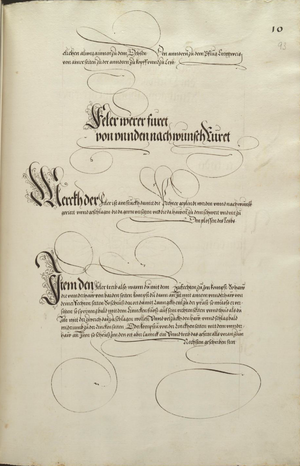|
|
You are not currently logged in. Are you accessing the unsecure (http) portal? Click here to switch to the secure portal. |
User:Kendra Brown/Latin Lew/86v
Jump to navigation
Jump to search
Munich 86v / PDF page 18
Missing zettel verses from PHM Dresden 93r (23)
German
- Feler werer furet
- von vnnden nach wunsch Ruret
English (Fritz)
- Fehler misleads/leads the weapon,
- from below it touches as it desires.
English (Garber)
- deceit, whoever leads it and contacts from below according to desire
Notes
86v a
86v a Latin
- De ictu erratico.
- Hoc ictu maximé occaecantur et decipiuntur Athletae,
- eosque exoptatò[^1][^2] qui tueri se conantur,
- ferire poteris,
- tum etiam[^3] eos qui ensem ferire non corpus curant.
86v a English
- Of the wild strike.
- Athletes are maximally blinded and deceived by this strike,
- and you will greatly desire those who endeavor to protect themselves,
- [because] you can strike,
- ALSO those who undertake to strike the sword, not the body.
Alternate ending
and you will be able to eagerly strike those who endeavor to protect themselves
86v a notes
our "undertake" is from "curant" Whitaker Logeion
[^1] this is "long for" (rendered as "greatly desire" here-- check dmlbs?). accent marks usually appear on adverbs-- what's that doing here?
[^2] optare participle -ato = adverb meaning "with desire, eagerly"
[^3] tum seems to be acting as an intensifier here
86v b
86v b Latin
- Eum igitur hac ratione usurpato,
- si ad hostem propius accesseris,
- ictus inferos ex latere utroque exerceas,
- at si inferiori ictu ex latere dextro facto ei adpropinquaris,
- subito mucronem ex acie longa pectori hostis inijcito,
- et tunc necesse erit,
- ut impetum tuum removeat,
- verum inde celeriter sinistro pede in latus adversarij dextrum prosilias,
- simulatoque,
- quasi transversario latus praedictum quassare volveris,
- sed retracto,
- vel mutato ictu,
- mox versus latus sinistrum ferito,
- Vel si eum accesseris de latere sinistro transversarium formans,
- etiam tum mucronem ex acie longa contra pectus hostile impellas,
- eumque habitum exerceas ut proximé praescriptum est.
86v b English
- Therefore, make use of that [strike] by means of this method,
- if you approach closer to the enemy,
- you employ the strike from below on both sides.
- but if you draw near to him with the strike having been made from below from the right side,
- suddenly inject the point to the chest of the opponent from the long edge,
- and thereupon it will become necessary,
- in order that he shifts your forward attack,
- truly thence quickly leap forward with the left foot to the right side of the adversary,
- and pretend,
- as if you would want to batter the side, as was described before with the transverse,
- but drawn back,
- or the thrust having been transformed,
- soon strike toward the left side,
- Or if you come near to him from the left side forming the transverse,
- and also then you drive the sword from the long edge against the breast of the enemy,
- and employ this skill from close in as described above.
86v b notes
two separate actions, also in German
leap is from prosilias
86v c
86v c Latin (Sandbox)
- De conversore et Transcursu.
- Hoc habitu uteris in progressu versus hostem,
- nam eo ipso hostem coartabis,
- ut transcurrere possis,
- eumque superare.
86v c English (Sandbox)
- About the turn over and running across
- You use this skill in the advance against the enemy,
- for instance, you restrict the enemy with it,
- so that you could run across,
- and overcome him.

